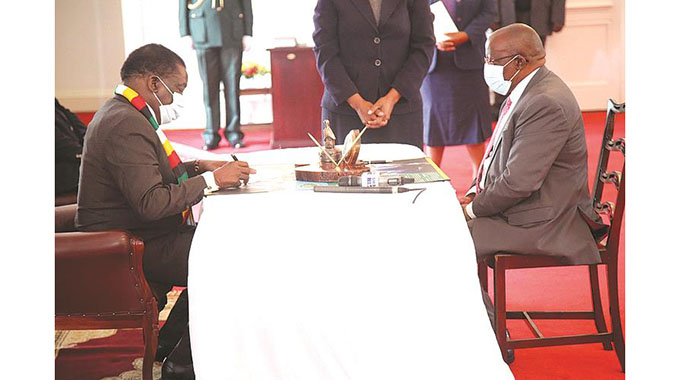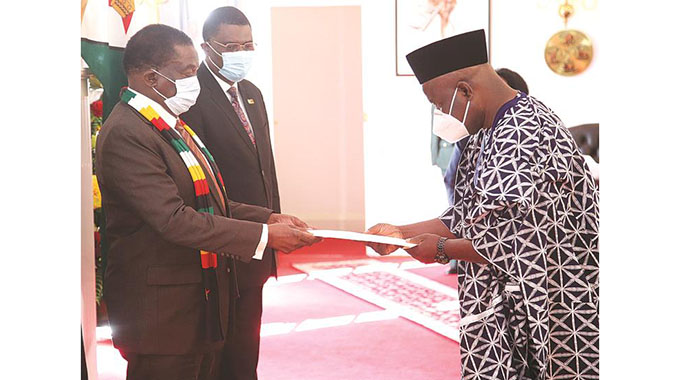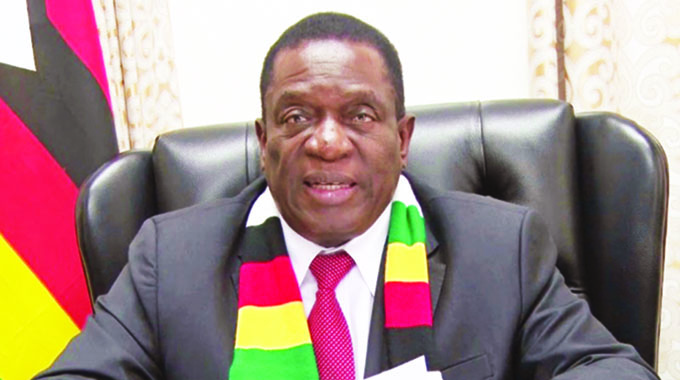Judges’ conduct worries Govt

Fungi Kwaramba-Political Editor
THE country must interrogate the best ways of appointing judges as there has been a worrying trend in the conduct of officers of the country’s apex courts that has resulted in the appointment of tribunals, senior Government officials said.
This comes as President Mnangagwa yesterday, as per the Constitution, appointed a three-member tribunal chaired by retired Justice Mafios Cheda to investigate the conduct of Justice Thompson Mabhikwa over an affair he had with a staffer at the Bulawayo High Court.
It also comes as another tribunal led by retired Judge Justice Simbi Mubako yesterday submitted its report on the fitness to hold office of suspended High Court judge, Justice Erica Ndewere.
After the swearing-in of the Justice Cheda led tribunal that includes Harare lawyer Philippa Philips and Midlands State University law lecturer Mr Chaka Mashoko, Justice, Legal and Parliamentary Affairs Minister Hon Ziyambi said time had come to interrogate the appointment of judges to the High Court.
He said while in the past the public was not aware of their rights and procedures of appeal, the Second Republic, with its commitment to the rule of law and constitutionalism, is providing a platform for people to air their grievances against judges.
“You must also appreciate that we changed the way that judges are appointed. We now have interviews, and it’s now open, it could be because of that we are now getting into the judiciary some of the officers perhaps who should not be there.
“Performance during interviews does not translate into performance at work. An interview is one of the measures that we use to get a person into office. Perhaps we need to interrogate and look at what we used to have and what we have now, what is the best criteria that we can use to select judges,” said Hon Ziyambi.
Although the Constitution was recently amended to enable the President, acting on the recommendation of the Judicial Service Commission, to promote a judge to a higher court, for initial appointment to the bench, the amendment retains the present system of nomination, interviews, and a shortlist of three names submitted to the President something that experts say is not enough.
Permanent Secretary in the Ministry of Justice, Legal and Parliamentary Affairs Ms Virginia Mabhiza said the high cases where tribunals are being set up was reflective of the transparency within the justice delivery system as well as spotlighting the need to fine-tune the selection criteria.
“To a certain extent, there is also the question of the procedure of the appointment of the judges where public interviews are conducted and people end up becoming judges based on that.
“Perhaps we must continuously review our law to see whether it is necessary to conduct these public interviews or rather we go by the old procedure where people would be properly vetted recommended and confirmed to the office of a judge.
“We need to increase our vetting system to assess the suitability of someone who wants to be a judge, how they fare, either in the community from where they hail from, even at their workplaces how they relate in general,” said Ms Mabhiza.
The Constitution provides for a judge to be removed from office only for inability to perform the functions of his or her office, due to mental or physical incapacity, or gross incompetence, or gross misconduct.
Otherwise, judges serve until retirement or resignation.
The process is deliberately designed to ensure judges have practical independence since ruling against the Government of the day in a judgment cannot lead to a tribunal hearing.
The Constitution further stipulates that if the Judicial Service Commission advises the President that the question of removing any judge, including the Chief Justice, from office ought to be investigated.
The President must appoint a tribunal to inquire into the matter.
He does not have much discretion in the matter. In the case of Justice Mabhikwa, the JSC recommended the setting up of a tribunal after nude pictures and raunchy WhatsApp messages, allegedly from the judge’s phone to a staffer at the High Court in Bulawayo went viral.
On the other hand, the investigation into Justice Ndewere was looking at her suitability to hold office on the grounds of sloppy work and delayed judgments.

President Mnangagwa receives a report from Justice Simbi Mubako, chair of a tribunal which was set up to conduct an inquiry into Justice Erica Ndewere’s suitability to remain in office at State House yesterday.
Ms Mabhiza said the three-member tribunal, led by Professor Mubako, and included Mr Charles Warara and Ms Yvonne Masvora formally handed over its findings to the President.
“They formerly handed the report, as you may be aware, the President put in place a tribunal to enquire into the contact of Justice Ndewere, they have finished their work and today they have presented their findings. I will not go into details because that is not my mandate, the Chief Secretary will make the announcements,” she said.









Comments